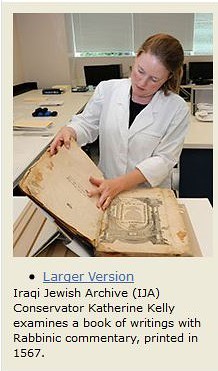That actually didn't happen to us.
It happened to the Jews of Iraq.

For background, let's go the US National Archives:
On May 6, 2003, just days after the Coalition forces took over Baghdad, 16 American soldiers from Mobile Exploitation Team Alpha, a group assigned to search for nuclear, biological, and chemical weapons, entered Saddam Hussein’s flooded intelligence building. In the basement, under four feet of water, they found thousands of books and documents relating to the Jewish community of Iraq – materials that had belonged to synagogues and Jewish organizations in Baghdad.
The water-logged materials quickly became moldy in Baghdad’s intense heat and humidity. Seeking guidance, the Coalition Provisional Authority placed an urgent call to the nation’s foremost conservation experts at the National Archives. Just a week later, National Archives Director of Preservation Programs Doris Hamburg and Conservation Chief Mary Lynn Ritzenthaler arrived in Baghdad via military transport to assess the damage and make recommendations for preservation of the materials. Both experts share this extraordinary story and take you “behind the scenes” in this brief video [http://tinyurl.com/IraqiJA]. This video is in the public domain and not subject to any copyright restrictions. The National Archives encourages its use and free distribution.
Given limited treatment options in Baghdad, and with the agreement of Iraqi representatives, the materials were shipped to the United States for preservation and exhibition. Since then, these materials have been vacuum freeze-dried, preserved and photographed under the direction of the National Archives. The collection includes more than 2,700 Jewish books and tens of thousands of documents in Hebrew, Arabic, Judeo-Arabic and English, dating from 1540 to the 1970s. A special website to launch this fall will make these historic materials freely available to all online as they are digitized and catalogued. This work was made possible through the assistance of the Department of State, National Endowment for the Humanities, and Center for Jewish History.
The Jews of Iraq have a rich past, extending back to Babylonia. These materials provide a tangible link to this community that flourished there, but in the second half of the twentieth century dispersed throughout the world. Today, fewer than five Jews remain.
The Jews of Iraq may have had a rich past. But since 2003, they've all but disappeared to the point that the total number of Jews now in Iraq can be counted on one hand. Judit Neurink (Rudaw) notes:
Director Saad Eskander of the National Library in Baghdad will be glad to receive the archives. From the start, he was against their trip to the United States, although he admits that Iraq could not look after them in 2003. “Iraq was in a chaos. Nobody was interested in our cultural heritage.”
Yet, the documents should have stayed, he says: “Instead of taking them away, the Americans should have taught the Iraqi’s how to repair and maintain them.”
The US shouldn't have taken these documents out of the country to restore them?
That was the crime, was it?
No, the crime was thieves stealing them from Iraqi Jews.
The crime is people like Saad Eskander thinking they have a right to stolen property that has nothing to do with their own heritage. Stewart Ain (Jewish Weekly) reported last week:
Harold Rhode, who discovered the trove while working as a Defense Department policy analyst assigned to Iraq’s transitional government, said he is “horrified” to think the material would be returned when it had been “stolen by the government of Iraq from the Jewish community.”
“It would be comparable to the U.S. returning to the German government Jewish property that had been looted by the Nazis,” he told The Jewish Week.
Attorney Carole Basri, whose great-grandfather served as chief rabbi of Iraq, pointed out that there was “no consultation” with the Jewish community before the Bush administration entered into that agreement. International law stipulates that national treasures be returned to the country of origin.
Rhode said the material, which been stored on the second floor of a Baghdad synagogue by Iraqi Jews at the time of their mass exodus in 1950-52 – some 135,000 Jews left the country, allowed to carry no more than one suitcase of clothing each – was taken by Saddam Hussein in 1984. (There are thought to be only five or so Jews left in all of Iraq.)
Joseph Dabby, 67, an Iraqi Jew in Los Angeles who was one of about 25,000 Jews who initially remained in his homeland, said he fears that should the items be returned, they would simply be locked away and never exhibited. Board chairman and former president of Los Angeles’ Kahal Joseph Synagogue, home to 300 Iraqi Jewish families, said he escaped from Iraq in 1971 after several imprisonments and does not trust the present Iraqi leadership.
The National Archives notes the collection includes:
The stolen property belongs to the Jewish community and with the Iraqi government having failed to protect the Jewish community, they certainly have no right to stolen property.
